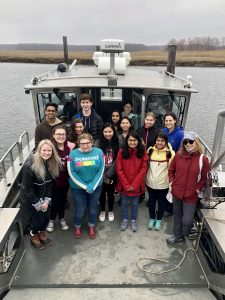Why Do We Need Science Communication?

Science communication is an integral part of scientists’ everyday lives. From writing papers and proposals, to giving talks, creating lectures, or composing tweets, it is imperative for scientists to learn how to effectively communicate to a wide range of audiences in order to be successful. Science communication has become a field within the scientific community in recent years and it generally refers to the public presentation of science-related topics to non-experts. Often called “outreach”, it can include science exhibitions, journalism, policy items, media productions, or the creation of hands-on learning activities or experiments. Effective science communication leads to a better educated public and possibly to more informed governmental decision making. Additionally, it can also help generate more support for scientific research and allow nations to be more economically competitive as more individuals become trained as engineers and scientists.
Course Overview
 This course will bring in experts in science and science communication from across Rutgers and from some of the leading museums and educational centers in the area (i.e. the American Museum of Natural History in New York City and the Liberty Science Center in New Jersey). The goal of this course is to teach students about the major findings behind some of the most important scientific issues of the day, as well as what are the most effective ways to communicate these issues to the public. Classes will be a mixture of guest lectures, field trips, class discussions, and hands-on in class activities to explore various concepts and problems in scientific research and education. The course will focus on the issues relevant to the earth and environmental sciences, but students will be encouraged to explore topics in other scientific fields that interest or are important to them.
This course will bring in experts in science and science communication from across Rutgers and from some of the leading museums and educational centers in the area (i.e. the American Museum of Natural History in New York City and the Liberty Science Center in New Jersey). The goal of this course is to teach students about the major findings behind some of the most important scientific issues of the day, as well as what are the most effective ways to communicate these issues to the public. Classes will be a mixture of guest lectures, field trips, class discussions, and hands-on in class activities to explore various concepts and problems in scientific research and education. The course will focus on the issues relevant to the earth and environmental sciences, but students will be encouraged to explore topics in other scientific fields that interest or are important to them.
By the end of the semester, students will have the ability and knowledge to confidently discuss complex scientific topics, as well as the tools needed to transmit their message clearly and concisely to a wide range of audiences. Most importantly, they will be able to reply when asked “so what?” and “why should I care about this science?”